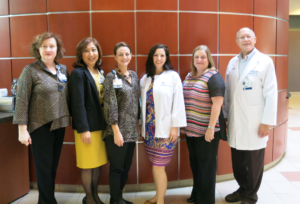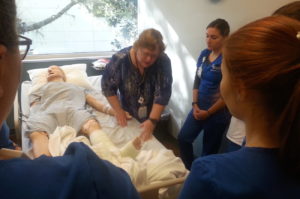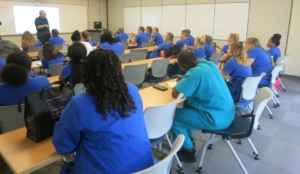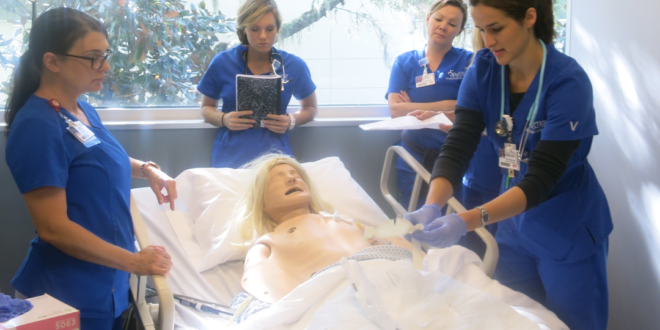The Brooks Rehabilitation College of Healthcare Sciences has partnered with Baptist Health on a Nurse Residency Program that offers a level of academic-setting and simulation training to newly graduated Baptist Health nurses that is the first of its kind in Jacksonville.
The innovative, academic-setting component of the 10-month program includes intensive training sessions featuring teamwork sessions and 12 weeks of clinical-based simulation scenarios and skill training. Nurses spend one day per week for three months focusing on patient assessment and interventions for wellness and disease processes in clinical-based scenarios in JU’s Simulation Training and Applied Research (STAR) Center.

The outcomes of the program are intended to increase the newly graduated nurses’ assessment skills, proficiency in procedures and critical thinking as they work through complex patient case scenarios that mimic what they will encounter in an actual hospital setting.
The School of Nursing team, under the direction of Dr. Kathleen Kavanagh, Assistant Professor of Nursing and Director of the STAR Center, collaborates with educators from Baptist Health to facilitate a variety of simulation experiences over the 12-week period.
The partnership is unique as an academic/clinical joint effort, with the shared goal of increasing the quality and safety of patient care, Dr. Kavanagh said.
“Hospitals are starting to require their nurses to take part in a residency program, and for the graduate nurse, this residency program can improve confidence and proficiency in the provision of care while also increasing nursing staff retention levels for the hospital,” she said.
In the program, the nurses are divided into cohorts so that focused teaching attention occurs in the areas of intensive care, emergency care, medical-surgical, labor and delivery, pediatric care, and neonatal intensive care. In the future, the residency program will expand to include home health care.
 The nurses’ simulated clinical work is coupled with months of working on their respective units and attending bi-weekly lectures and workshops on core nursing issues such as communication, teamwork and leadership skills. Additionally, each week the nurses meet with master clinical coaches to discuss their progress and share their experiences.
The nurses’ simulated clinical work is coupled with months of working on their respective units and attending bi-weekly lectures and workshops on core nursing issues such as communication, teamwork and leadership skills. Additionally, each week the nurses meet with master clinical coaches to discuss their progress and share their experiences.
This collaboration continues a partnership that had its origins in the development of the JU nursing program more than 30 years ago.
“The partnership with JU has taken the classical Nurse Residency Program to another level,” said Liz Bruno, Executive Director of Education and Human Performance Improvement at Baptist Health. “Most programs focus on core skills and ideas. Adding the opportunity for focused experiential learning in clinical areas has improved our residents’ understanding, competence and confidence. Feedback from the clinical coaches and the nurse managers has been excellent. We realize how fortunate we are to be able to enhance our program through this partnership.”

Baptist Health has invested a great deal of time and resources to ensure that the newly hired nurses have ongoing mentoring and continuing education to ensure their professional growth and delivery of excellent care to patients, Bruno said.
“Newly employed Baptist Health graduate nurses begin the residency program as novice nurses,” said Diane Raines, DNP, RN, NEA-BC, senior vice president and chief nursing officer for Baptist Health. “As the nurses near completion of the program, it is evident that they have gained greater competence, critical thinking and a collaborative teamwork approach to care.”
The learning environment is a safe environment that allows nurses to learn how to provide quality and safe care. As many as 17 different scenarios can be planned and implemented on any given day.
The JU/Baptist Health Nurse Residency Program welcomed its first cohort of 110 nursing residents in September 2015, then trained a second cohort of 65 nursing residents, and welcomed its third cohort of 89 nursing residents in July 2016.
“We are honored to partner with Baptist Health on their endeavor to enhance quality patient care for generations to come,” Dr. Kavanagh said.
The Brooks Rehabilitation College of Healthcare Sciences is committed to its community partners and has a responsibility to have reciprocal relationships with premier hospitals that optimize clinical training, said Dr. Christine Sapienza, Dean of the college.
“This works to close the gaps between academic practice outcomes and those needed for the development of necessary professional nursing expertise,” Dr. Sapienza said. “The Baptist Health clinical simulation setting nurse residency program and JU collaboration are the first of its kind in Jacksonville.”
The new residency program supports the goals of the School of Nursing and Baptist Health: to increase the confidence and competency of newly graduated nurses in delivery of safe care to patients and their families, said Dr. Cheryl Bergman, Associate Dean of the School of Nursing.
To learn more about the Brooks Rehabilitation College of Healthcare Sciences, visit www.ju.edu/chs. For more about Baptist Health, visit https://www.baptistjax.com.
 Wave Magazine Online Jacksonville University News Hub
Wave Magazine Online Jacksonville University News Hub
